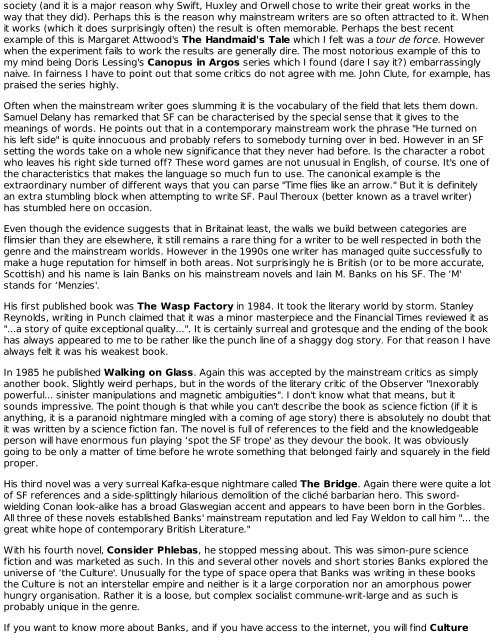Triffids Beard 2 - The Bearded Triffid
Triffids Beard 2 - The Bearded Triffid
Triffids Beard 2 - The Bearded Triffid
You also want an ePaper? Increase the reach of your titles
YUMPU automatically turns print PDFs into web optimized ePapers that Google loves.
society (and it is a major reason why Swift, Huxley and Orwell chose to write their great works in the<br />
way that they did). Perhaps this is the reason why mainstream writers are so often attracted to it. When<br />
it works (which it does surprisingly often) the result is often memorable. Perhaps the best recent<br />
example of this is Margaret Attwood's <strong>The</strong> Handmaid's Tale which I felt was a tour de force. However<br />
when the experiment fails to work the results are generally dire. <strong>The</strong> most notorious example of this to<br />
my mind being Doris Lessing's Canopus in Argos series which I found (dare I say it?) embarrassingly<br />
naive. In fairness I have to point out that some critics do not agree with me. John Clute, for example, has<br />
praised the series highly.<br />
Often when the mainstream writer goes slumming it is the vocabulary of the field that lets them down.<br />
Samuel Delany has remarked that SF can be characterised by the special sense that it gives to the<br />
meanings of words. He points out that in a contemporary mainstream work the phrase "He turned on<br />
his left side" is quite innocuous and probably refers to somebody turning over in bed. However in an SF<br />
setting the words take on a whole new significance that they never had before. Is the character a robot<br />
who leaves his right side turned off? <strong>The</strong>se word games are not unusual in English, of course. It's one of<br />
the characteristics that makes the language so much fun to use. <strong>The</strong> canonical example is the<br />
extraordinary number of different ways that you can parse "Time flies like an arrow." But it is definitely<br />
an extra stumbling block when attempting to write SF. Paul <strong>The</strong>roux (better known as a travel writer)<br />
has stumbled here on occasion.<br />
Even though the evidence suggests that in Britainat least, the walls we build between categories are<br />
flimsier than they are elsewhere, it still remains a rare thing for a writer to be well respected in both the<br />
genre and the mainstream worlds. However in the 1990s one writer has managed quite successfully to<br />
make a huge reputation for himself in both areas. Not surprisingly he is British (or to be more accurate,<br />
Scottish) and his name is Iain Banks on his mainstream novels and Iain M. Banks on his SF. <strong>The</strong> ‘M'<br />
stands for ‘Menzies'.<br />
His first published book was <strong>The</strong> Wasp Factory in 1984. It took the literary world by storm. Stanley<br />
Reynolds, writing in Punch claimed that it was a minor masterpiece and the Financial Times reviewed it as<br />
"...a story of quite exceptional quality...". It is certainly surreal and grotesque and the ending of the book<br />
has always appeared to me to be rather like the punch line of a shaggy dog story. For that reason I have<br />
always felt it was his weakest book.<br />
In 1985 he published Walking on Glass. Again this was accepted by the mainstream critics as simply<br />
another book. Slightly weird perhaps, but in the words of the literary critic of the Observer "Inexorably<br />
powerful... sinister manipulations and magnetic ambiguities". I don't know what that means, but it<br />
sounds impressive. <strong>The</strong> point though is that while you can't describe the book as science fiction (if it is<br />
anything, it is a paranoid nightmare mingled with a coming of age story) there is absolutely no doubt that<br />
it was written by a science fiction fan. <strong>The</strong> novel is full of references to the field and the knowledgeable<br />
person will have enormous fun playing ‘spot the SF trope' as they devour the book. It was obviously<br />
going to be only a matter of time before he wrote something that belonged fairly and squarely in the field<br />
proper.<br />
His third novel was a very surreal Kafka-esque nightmare called <strong>The</strong> Bridge. Again there were quite a lot<br />
of SF references and a side-splittingly hilarious demolition of the cliché barbarian hero. This swordwielding<br />
Conan look-alike has a broad Glaswegian accent and appears to have been born in the Gorbles.<br />
All three of these novels established Banks' mainstream reputation and led Fay Weldon to call him "... the<br />
great white hope of contemporary British Literature."<br />
With his fourth novel, Consider Phlebas, he stopped messing about. This was simon-pure science<br />
fiction and was marketed as such. In this and several other novels and short stories Banks explored the<br />
universe of ‘the Culture'. Unusually for the type of space opera that Banks was writing in these books<br />
the Culture is not an interstellar empire and neither is it a large corporation nor an amorphous power<br />
hungry organisation. Rather it is a loose, but complex socialist commune-writ-large and as such is<br />
probably unique in the genre.<br />
If you want to know more about Banks, and if you have access to the internet, you will find Culture


